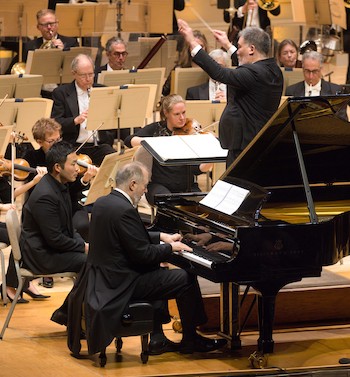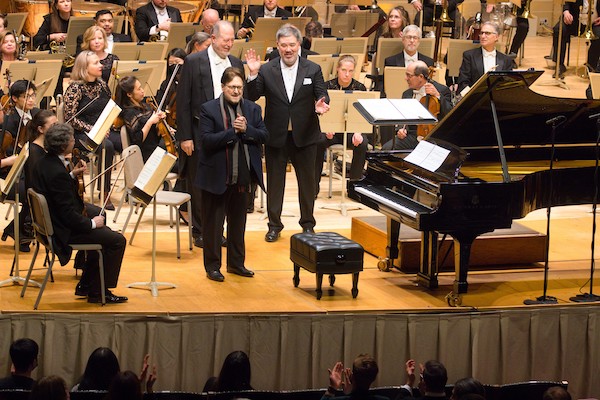Concert Review: Boston Symphony Orchestra Plays Dello Joio, Stenhammar, Boulanger, and Dvořák
By Aaron Keebaugh
Justin Dello Joio’s Concerto for Piano and Orchestra, written especially for pianist Garrick Ohlsson, creates an emotionally satisfying canvas out of thorny harmonies and astringent lyricism.

Pianist Garrick Ohlsson performs the world premiere of Justin Dello Joio’s piano concerto Oceans Apart. Photo: Hilary Scott.
Justin Dello Joio’s new piano concerto may strike some as just another essay in dissonance and dramatic urgency. But the score, which Alan Gilbert is conducting with the Boston Symphony Orchestra this weekend, reflects our troubling present while paying deep respect to soloist Garrick Ohlsson.
Ohlsson has long championed Dello Joio’s music, having recorded the composer’s dark and sinuous piano sonata and concert etudes in 2007. But the Concerto for Piano and Orchestra, written especially for the pianist, creates an emotionally satisfying canvas out of thorny harmonies and astringent lyricism.
Together, Ohlsson and Gilbert projected all its grit and power in Thursday’s memorable world premiere at Symphony Hall.
The concerto’s subtitle, Oceans Apart, suggests the irreconcilable differences that make today’s political and cultural landscape so glaringly painful. But rather than offer easy solace or by-the-numbers resolution, the music leans into those divisions, embracing the mystery and tension of conflict across its 20-minutes.
Gestural in the best sense of the word, the concerto situates the pianist less as a hero struggling against the masses than as another voice lost in the chatter. Wisps of phrases flower into arpeggios that carry the energy forward. The orchestra frames the soloist in eerie sonorities before suddenly blaring at full force, like a dissonant shout chorus. The music ends as it began, fading into rustling wind, then an uneasy silence.
Throughout, Ohlsson and Gilbert probed the work’s depths. The pianist was both assured and subtle, the conductor a sturdy guide who let the at times see-sawing music unfold naturally. The audience rewarded the performers and composer with a warm ovation.
The rest of the evening was dedicated to works by Wilhelm Stenhammar, Lili Boulanger, and Antonin Dvořák.
Stenhammar’s Serenade has become a specialty for Gilbert, who led the work with the BSO at Tanglewood in 2021. Before that performance, he referred to the piece as “the love child of Strauss and Sibelius.”
While the original 1913 version bears the rousing lyricism of the former, the revised version from 1919, heard Thursday, recalls more of Sibelius’s lean and tuneful style.
Gilbert’s brisk tempos allowed for the humor and vitality of the Overtura to bubble to the surface, aside from a few sour wind notes and unfocused string passages. Lower strings brought out the hymnic serenities of the slow section, and the woodwind lines flowed gracefully to supply an answer.
The highlight of the Canzonetta was the duet between concertmaster Alexander Velinzon and principal cellist Blaise Déjardin, a silvery line against a dark backdrop. The Scherzo bounded; the Trio lilted with bucolic verve.
Gilbert unveiled the Notturno with keen attention to the wind, which curled their melodies into soft shapes. The Finale tittered, the reading light but never lightweight.

Ovation with pianist Garrick Ohlsson, composer Justin Dello Joio, and conductor Alan Gilbert. Photo: Hilary Scott.
Lili Boulanger’s D’un Matin de printemps flared just as much color and zest in its brief five minutes. Composed in 1918, the last year of the composer’s life, this score is at once sparkling, coy, even impish. Gilbert focused on the score’s details without becoming bogged down. Strings played with gentle sweep, while solo oboe, bassoon, and horn peeked out of the texture to provide some satisfying sonic variety.
The evening’s closer, Dvořák’s familiar Carnival Overture, delivered enough joy and excitement to remind one that — in a program of such weight and dimension — it’s always best to cleanse the ear with a closing bang.
Aaron Keebaugh has been a classical music critic in Boston since 2012. His work has been featured in the Musical Times, Corymbus, Boston Classical Review, Early Music America, and BBC Radio 3. A musicologist, he teaches at North Shore Community College in both Danvers and Lynn.
Tagged: Alan Gilbert, Boston Symphony Orchestra, Garrick Ohlsson

